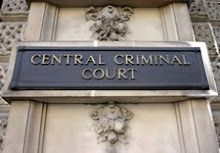Central Criminal Court
THE TABLET
WEDNESDAY 13 May , 1840.
[Before Mr. Baron Alderson.]
[Before Mr. Baron Alderson.]
Mr. Baron Alderson ordered Catherine Mitchell (who was last session found guilty of administering laudanum to her illegitimate child, in consequence of which it died) to be brought up for judgment. When the prisoner was placed at the bar,
Mr. Baron Alderson said, that she had been convicted before him of the crime of murder. The circumstances were these:- She was the mother of a child nine months old, and having conceived the wicked design of destroying its life, she gave to the nurse who had charge of it a bottle, which she stated contained medicine, but which in reality contained a quantity of laudanum, and which she directed to be administered to the child. The nurse took the bottle, but did not intend to administer any portion of its contents. She placed it on the mantel-shelf, where, by God's providence, it remained for five days, during which time she (the prisoner) had an opportunity of relenting, but she did not do so, and after five days had elapsed, Providence, for its own purposes, allowed her wicked intentions to be carried into effect. She did not interpose to save the life of her offspring, and that life was at length destroyed by the instrumentation of a child of five years of age, who innocently administered the deadly poison to the unhappy infant. The judges of the land had taken the circumstances into their consideration, and they were unanimously of the opinion that the administering of the poison by that child under these circumstances was just the same as though she had herself administered the poison; and their unanimous opinion was, that she had been properly convicted of murder. The intelligent jury who had tried her, had recommended her to mercy, on account of the circumstances of her past life, as it appeared she had been seduced and deserted by the man who betrayed her. The recommendation to mercy had been taken into consideration by himself and the other learned judges, and after some deliberation, they had come to the conclusion that the sentence of death might be recorded, and that her life should be spared. He hoped she would, in the long exile to which she must necessarily be subjected, employ her life in the most abject penitence, with a view to obtain pardon from God for the grievous offence she had committed.
Sentence of death having been recorded against the prisoner, she was removed from the bar.
ATTEMPT TO MURDER. - Samuel Bailey , a sailor, was indicted for cutting and wounding William Coombes with a hatchet, with intent to kill and murder him.
William Coombes stated that he was a seaman, and had been on board the Sprightly schooner on her voyage in April last from St. Michael's to Falmouth. About eight o'clock in the evening of the 20th of April, witness was asked by the prisoner where the axe was? Witness told him that he had laid it under the windlass. The prisoner then went and got it, and placed it in the galley. He conversed until ten o'clock with the captain, who then went below. The conversation appeared very friendly, and Bailey accompanied the captain below. They afterwards came on deck together and in a few minutes afterwards witness heard the captain call out, "Murder! I am a dead man." The prisoner then ran towards witness with an axe and a knife in his hand, and said, if he spoke he was a dead man. Witness said, "Good God, Sam, is that you?" No reply was made; but the prisoner instantly struck witness on the head with the axe. The blow cut through his hat, and wounded his head. He then seized the axe, and the prisoner cut his hands with the knife, and endeavoured to get to his throat. In attempting to stab him in the throat, the prisoner inflicted a wound under his eye. Witness called out, and the mate came to his assistance, and after a struggle, the prisoner was secured. The prisoner was very comfortable during the voyage, and was quite sober at the time in question.
By Mr. Baron Alderson. - The prisoner was sent on board the Sprightly as a deserter from her Majesty's service. I suppose the prisoner's object was to make his escape, if possible.
The mate, James Bowles, gave corroborative evidence, and added that, when the prisoner was secured, it was discovered that the forecastle was fastened down, to prevent the men from coming upon deck. The captain was not yet recovered; his skull was fractured.
In answer to the charge, the prisoner said that he had drank two glasses of liquor on the day in question, and having got a wound in his head, liquor had a great effect upon him. He knew nothing about what had occurred.
The jury pronounced a verdict of Guilty.
Mr. Espinasse said that the captain was now lying at Falmouth, and was not expected to recover from the effects of the blows he received from the prisoner.
The learned judge ordered the prisoner to be called up for judgment, and said, the offence of which he had been convicted was one of a very serious description, and no doubt could remain but that his intention was to have destroyed the whole of the crew, in order that he might make his escape. No hope, therefore, under all the circumstances, could be held out to him of obtaining mercy in this world, and it was now the duty of the court to pass upon him the utmost sentence of the law. The learned judge then passed sentence of death upon him in the usual form, and he was removed back to Newgate.

No comments:
Post a Comment